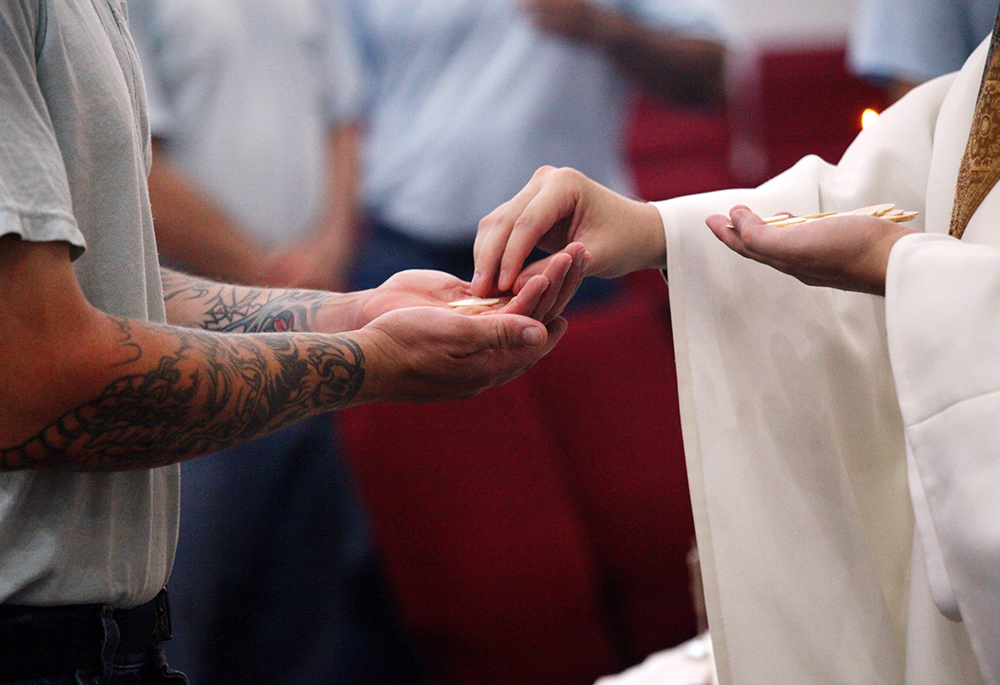
A file photo shows an inmate receiving Communion at the Ellsworth Correctional Facility in Kansas. (OSV News/CNS file/The Register/Karen Bonar)
"Get ready for a trip!" That could well be our call to worship as we begin the celebration of this "Solemnity of the Body and Blood of Christ."
We start this journey remembering the long trek of our Israelite ancestors in the desert. As we think of them, it's helpful to be aware that the scriptural sense of remembering implies reliving an event ourselves, entering into the story and being transformed by it in our day and our way, getting our own taste of the original participants' experience.
This is precisely what Moses calls for in our reading from Deuteronomy. Moses tells them, "Remember how … Remember how God let you be tested so that you would learn just how faithful you were willing to be. Remember how in your hunger you were ready to give up on God until desperation helped you recognize God's care for you in ways you had never expected. Remember what happened to you as you journeyed with God for all those years. Remember, you were slaves. Now, if you are willing, you can be free." Moses invited the people to remember so that they could continue discovering God's love and care in ever-new ways. With that start, we can approach Chapter 6 of John's Gospel as a long meditation on God's new way of giving life through Jesus.
The Gospel of John, written about 60 years after Jesus' resurrection, is more a theological reflection than a historical or biographical document. At the risk of oversimplification, one might suggest that the Gospels of Matthew, Mark and Luke can be experienced as invitations to contemplate of the life of Jesus while John invites us into mysticism, the experience of word of God drawing us into union with Christ in ways that go beyond words.
Very often in John, Jesus says things that people understand on the most mundane level possible. He then invites them to think more profoundly until they become caught up in unexpected depths of insight which lead to union with him. (Remember the ideas of being born again in Chapter 3, the living water in Chapter 4, etc.) The move from the superficial to the depths is the very process through which Jesus has tried to lead disciples from the day of their/our calling through his ascension, and on through today.
Our selection from John 6 is a small excerpt from a long story and discourse which includes the miraculous sharing of bread and fish, Jesus' walking on the water, and a full discourse that includes the summary selection we hear today. Jesus' core idea here is: "Whoever eats my flesh and drinks my blood dwells in me and I in her/him." This teaching can be taken in such a literal way that it sounds disgusting and/or impossible. Remembering John's literary techniques, we know we need to look deeper. What was Jesus trying to say?
Advertisement
When we consider the experience of eating and drinking, we become aware of two things: eating and drinking are absolutely necessary for life and what we eat becomes a part of us — it literally becomes our flesh and blood. Although we rarely consider it, the most intimate connection we have in life is with what we eat. By comparing our reception of himself to food, Jesus reveals his desire for such an intimate connection with us that it can only be expressed by saying, "I dwell in you." Astoundingly, he adds, "and you dwell in me." With these words, Jesus explains that he is inviting us into the profound mutuality we call communion.
When we meditate on this, another idea draws our attention. Jesus gives us an additional explanation saying, "Just as I have life because of the father, so also the one who feeds on me will have life because of me." As we also hear in John 17:22-23, Jesus is inviting his disciples to take him in as the bread of life, to become one in him and share in his own life and relationship with the father. Paul summarizes this for the Corinthians that by saying that as they share the bread and cup, they become one body in Christ.
Where does this feast invite us to go? Like the entire Gospel of John, it invites us to venture beyond what we see and to imbibe Christ's invitation to communion. As we do so, we remember that although each of us must accept the invitation personally, we are invited into this communion with God in Christ as members of the body of Christ, a people who share the same mission to bring and be communion for all the world.
This becomes the trip of a lifetime.
